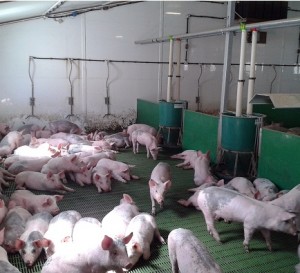A leading environmental specialist has urged producers to be aware of the impact of “temperature lift” in a piggery and the influence that can have on stock feed intake and growth rates.
Temperature lift is the term used to describe the difference between the outside (ambient) temperature and that inside a piggery during warm weather, when the ventilation rate has reached its programmed maximum. According to Tim Miller of ARM Buildings, it’s a production factor which can affect the performance of all classes of housed pigs.
“Recent research work at Hillsborough in Northern Ireland has shown that reducing the temperature in farrowing houses is one of the easiest ways to improve sows feed intake and increase piglet weaning weights,” he said, adding that temperatures inside farrowing houses often soars to over 24°C when the outside temperature is 18°C.
“Where possible, temperature lift should be restricted to around 3°C-4°C. If this can’t be achieved then ventilation capacity should be increased, either by fitting extra fans or increasing the size of existing ones.”
He also warned that temperature lift can significantly affect finishing houses, particularly where farmers have switched from continuous to batch systems.
“With continuous systems the average total weight of pigs is lower than the latter stages of batch systems when all the pigs are nearing finishing weight,” said Mr Miller. “The pigs’ heat output is considerably higher and this can cause problems in warmer weather where the ventilation systems weren’t originally designed for batch systems.”
He also noted that monitoring results had shown that finishing buildings which reach 28°C during the afternoon can drop to 18°C in the evening, adding that pigs do not like such swings in temperature.
“In warmer weather, we suggest running a slightly higher set temperature which means the temperature doesn’t drop as rapidly in the evening,” he said. “This also gives lower running costs.”
These pigs are comfortable, but temperature lift can cause problems inside piggeries if not dealt with effectively, says Tim Miller




